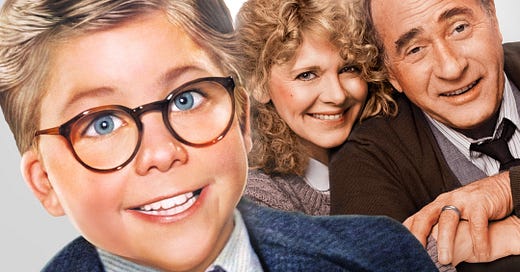Every year, about this time, you see the same old argument crop up in conversation and online: is Bob Clark’s classic 1983 film “A Christmas Story”, based on Jean Shepherd’s novel “In God We Trust, All Others Pay Cash”, a Christmas movie?
The question gets people really fired up, and they passionately defend their viewpoint - some are adamant that “A Christmas Story” definitely IS a Christmas movie, while others just as vehemently insist that it can’t possibly be.
Well, I’ve decided, just for fun, to wade into the controversy this year, and give my opinion. Some of you might be quite surprised to learn that I come down on the “for” side: that is, I believe that, all things considered, “A Christmas Story” IS a Christmas movie. But before you fire back, let me just explain why. Here are all the elements to be found in “A Christmas Story” that I think, when added together, make it reasonable to include it in the Christmas movie category.
The Season. “A Christmas Story” is, to all appearances, set during winter. The characters are all dressed in winter clothing, in several shots snow is visible, and in one scene a character’s tongue is frozen to a pole, something unlikely to happen during any other season. While not definitive, it is certainly a fact that in North America, Christmas falls in winter, and so if “A Christmas Story” is not definitely set AT Christmas, it seems to be set at a time reasonably close to it.
Gifts. There are numerous references during “A Christmas Story” to presents and gift-giving. Protagonist Ralphie (Peter Billingsley) is asked on several occasions what sort of gift he would like, and frequently mentions that he hopes he will be given a gift of some kind. This theme even carries into his school life, where presents are given as the theme of an essay-writing assignment. Ralphie also gives a gift to his teacher, and at the end of the film his whole family gives and receives an assortment of gifts. Obviously one can give and receive gifts at times other than Christmas, but the fact that the subject crops up so often in “A Christmas Story” is strong evidence that the characters are living through a period when presents are prevalent in the public consciousness, and Christmas is one of the likeliest periods for this to be so.
Santa. He is only in the film briefly, and less sharp-eyed viewers might miss him entirely, but in one scene a character appears who is dressed in a red suit and white beard that is extremely similar to popular conceptions in western culture of Santa Claus. It seems unlikely that a movie set at a time other than Christmas would include such a character.
Dialogue. At one point in the film, Ralphie’s teacher literally says “Merry Christmas” to him. Unless this is a moment of biting sarcasm, it seems probably that the reason she says this is that it is Christmastime.
Food. In one scene, Ralphie’s mother (Melinda Dillon) cooks turkey for the family, a dish traditionally associated with Christmas, although it is also connected with Thanksgiving, so this is not a clincher on its own.
Life lessons. Classic Christmas movies generally convey positive messages and lessons regarding the importance of family, love and charity. “A Christmas Story” includes strong themes along these lines. In one scene Ralphie’s parents weep with rergret at having inadvertently caused their son’s blindness, demonstrating how important it is to always care for your family and look out for their welfare. In another scene, Ralphie defends his family from robbers with the use of his trusty gun, which illustrates the value of families sticking together and facing challenges together. These are very much the kind of moral signals that most Christmas movies try to send.
Music. A climactic scene features Chinese waiters singing “Deck the Halls With Boughs of Holly”, usually considered a Christmas song, although it also could’ve just been the only song they knew.
So there you have it. I agree that none of these elements, on their own, proves that “A Christmas Story” is a Christmas movie, but I think that if you take them all together, it’s fairly convincing, and we are entirely justified in calling it such. I’d be fascinated to hear what you think!



